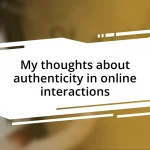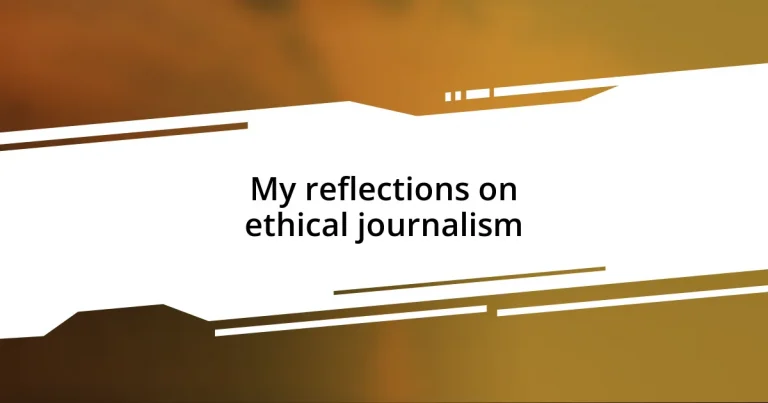Key takeaways:
- Ethical journalism is grounded in truthfulness, accuracy, fairness, and accountability, emphasizing the importance of cross-checking facts and minimizing harm while reporting sensitive issues.
- Integrity in journalism builds public trust and encourages transparency, highlighting the responsibility of journalists to maintain ethical standards and enhance story impact.
- Addressing bias is crucial for achieving objectivity; self-reflection and transparency about personal biases can enrich storytelling and foster audience trust.
- Balancing public interest with individual privacy requires empathy, as journalists must navigate the fine line between informing the public and respecting the dignity of those involved in sensitive stories.
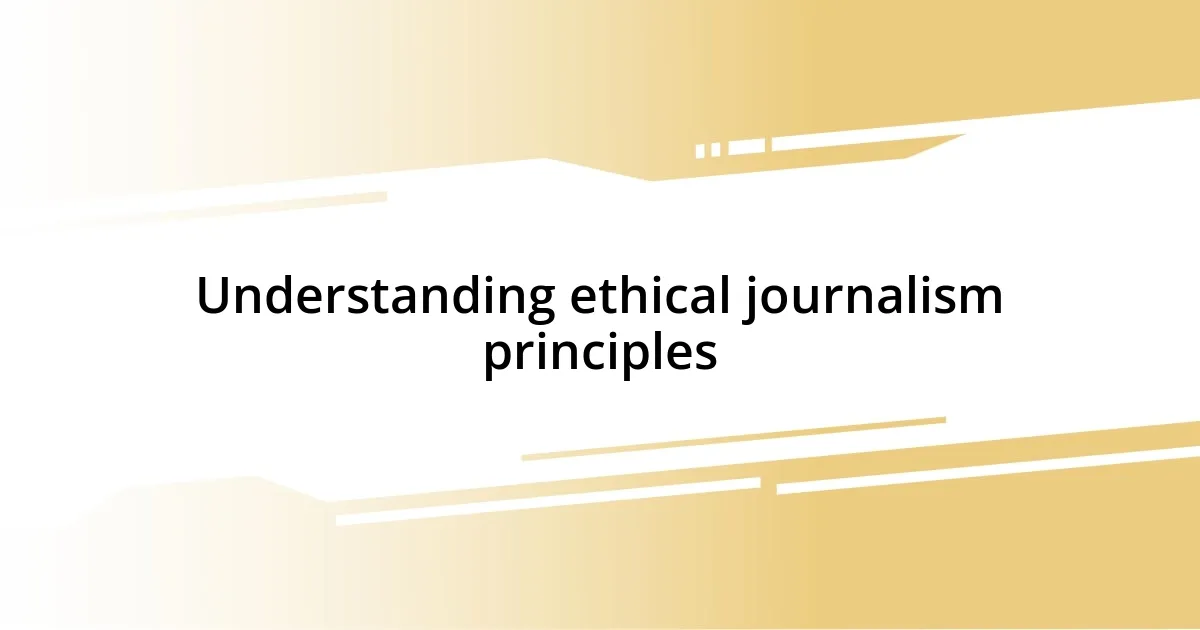
Understanding ethical journalism principles
Ethical journalism revolves around core principles like truthfulness, accuracy, and fairness. I remember a time when I faced a dilemma about publishing a story that had conflicting sources. It tugged at my conscience, and I realized how vital it is to cross-check facts before sharing them. Can you imagine how the public perceives a journalist who doesn’t uphold these values?
Another essential principle is the necessity of minimizing harm. I’ve often grappled with the challenge of reporting sensitive issues, like a community tragedy. It’s heartbreaking to consider the impact of my words on affected families. Reflecting on this, I always ask myself: “How can I convey this story respectfully while still informing the public?” This leads to a deeper understanding of our role as storytellers.
Lastly, I can’t emphasize enough the importance of accountability. There was an instance where I inadvertently misrepresented a source’s views, and the fallout was profound. Holding ourselves accountable not only enhances our credibility but also fosters trust with our audience. Have you ever thought about how a simple correction could strengthen that bond with your readers?
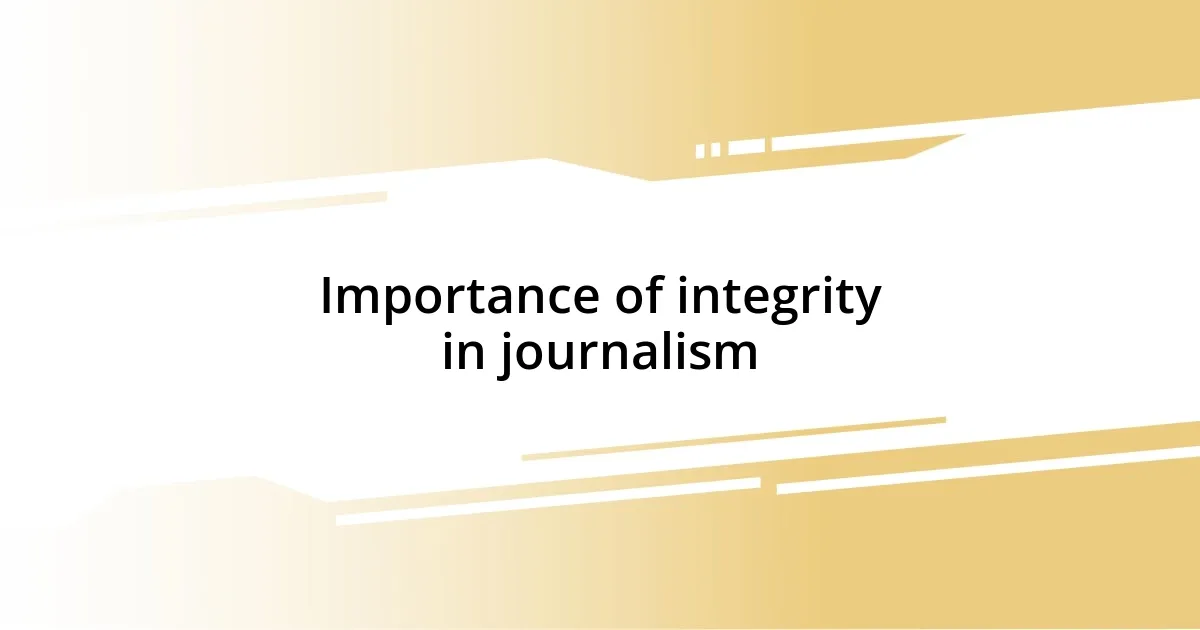
Importance of integrity in journalism
Integrity in journalism is a cornerstone that can make or break a reporter’s reputation. I recall an incident during an investigative piece where I faced pressure to sensationalize findings for a more gripping headline. It was tempting, but I knew that sacrificing integrity for attention would erode not only my credibility but also the trust of my readers. That moment reinforced my belief that integrity is about more than just words on a page; it’s about establishing a relationship built on honesty with the audience.
When journalists maintain integrity, it allows for a more accurate and trustworthy portrayal of the events they cover. Here are some key reasons why integrity matters:
- Builds Public Trust: Readers are more likely to engage with and rely on a journalist who consistently presents truthful information.
- Encourages Transparency: An honest approach fosters an environment where sources are willing to share their stories without fear of misrepresentation.
- Upholds Professional Standards: Demonstrating integrity sets a bar for colleagues, contributing to a culture of ethical journalism that benefits the entire industry.
- Enhances Story Impact: Stories grounded in truth resonate more deeply, ultimately creating a more informed and aware society.
Every time I reflect on these aspects, I’m reminded of our profound responsibility as journalists to uphold these values.
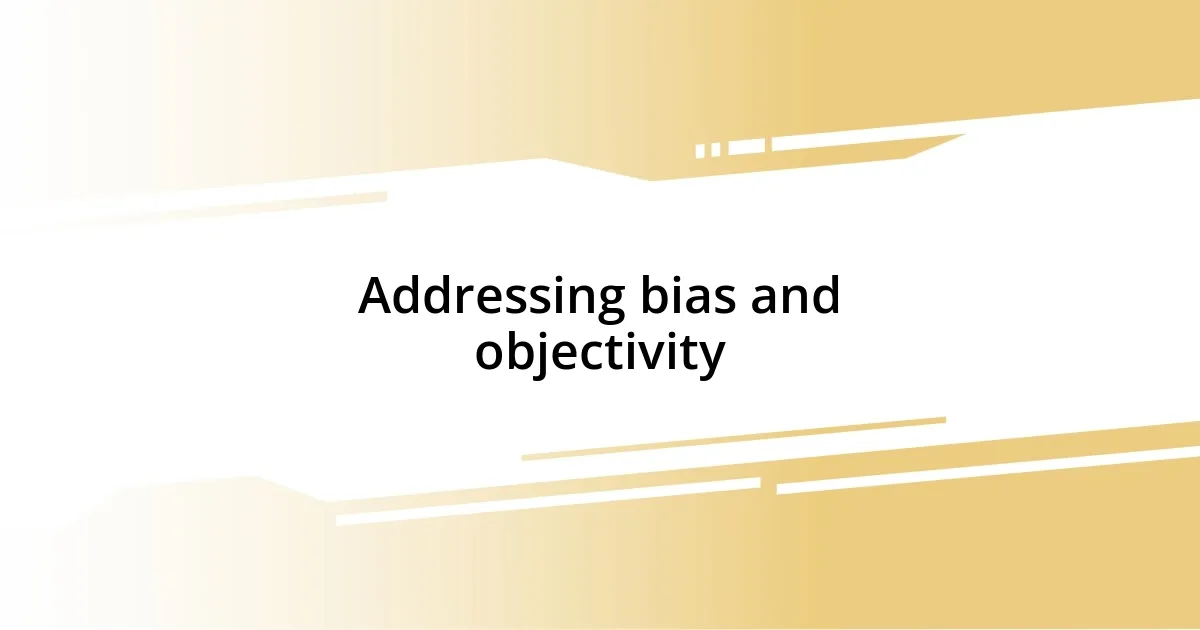
Addressing bias and objectivity
Addressing bias and objectivity in journalism is a topic that’s often overlooked, yet it’s incredibly crucial to our responsibility as storytellers. I remember working on a piece about a local protest and feeling the weight of my perspective heavily influencing the narrative. Sometimes, it’s easy to slip into a subjective lens without realizing it. I found it invaluable to take a step back, remind myself to consider all sides, and incorporate diverse viewpoints. This awareness not only enriches the story but also fosters a sense of trust with the audience.
I’ve encountered moments where my biases were brought to light, forcing me to confront my preconceived notions, particularly around socially charged issues. Once, after writing a piece that unintentionally reflected my bias on a polarizing topic, I received quite a bit of backlash. This taught me the importance of self-reflection, the necessity of questioning my own views and assumptions before publishing. What a great reminder that to achieve objectivity, I must continually engage in honest self-assessment and recognize the inherent biases we all carry.
It’s evident to me that bringing transparency into our editorial decisions can address bias more effectively. During a reporting project, I made it a priority to disclose my motivations and potential biases. Surprisingly, this approach invited more open dialogue with my readers, who appreciated the honesty. It made me realize that acknowledging bias doesn’t undermine objectivity; instead, it enriches the journalistic process by inviting diverse perspectives and fostering deeper connections.
| Aspect | Bias | Objectivity |
|---|---|---|
| Definition | Personal interpretation that can skew reporting | Neutral reporting that seeks to present all sides fairly |
| Impact on Audience | May erode trust and credibility | Builds trust through transparency and fairness |
| Self-awareness | Often overlooked; requires introspection | Essential; promotes conscious reporting practices |
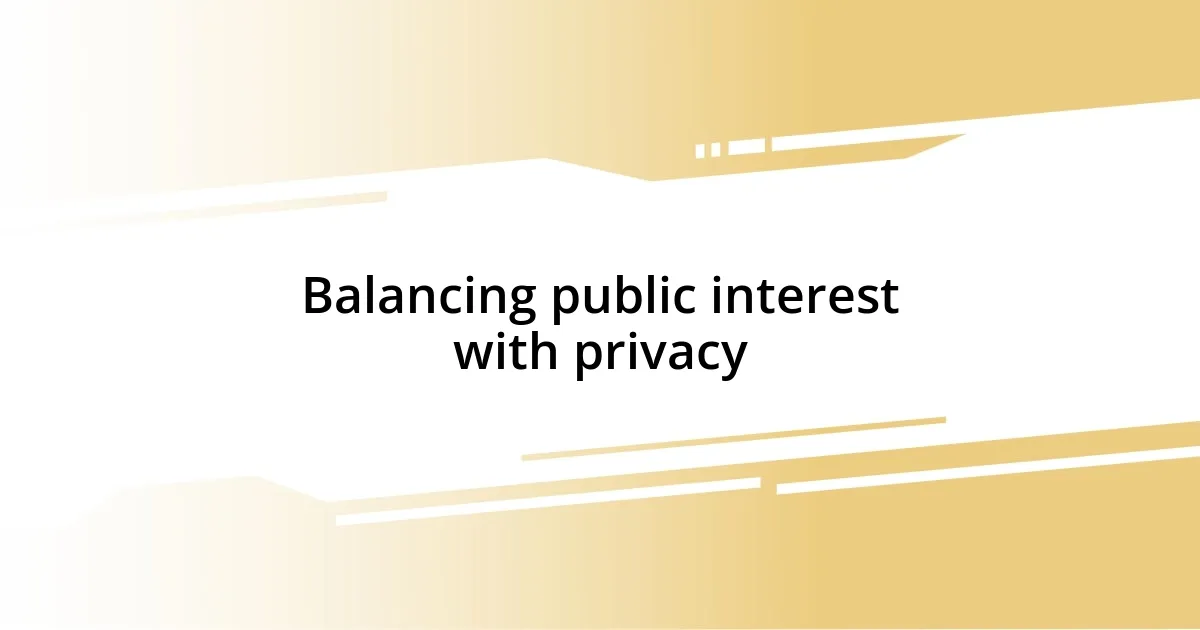
Balancing public interest with privacy
Finding the right balance between public interest and privacy is an ongoing challenge in journalism. I remember when I was covering a high-profile criminal case, and a family member of the accused reached out to me. They were understandably distressed and expressed their fear of being painted as villains in the media. This interaction struck me deeply. It forced me to wrestle with the question: At what point does public interest cross the line into the exploitation of personal grief?
There are moments when revealing sensitive information can contribute to the public’s understanding. Yet, I’ve learned the hard way that there are also stories where silence is golden. In one instance, I published a report about a tragic accident that included details about the victims’ backgrounds. Upon reflection, I realized these details did little to serve the narrative or inform the public meaningfully; instead, they intruded upon the families’ mourning process. The guilt that followed was a stark reminder that discretion is just as vital as disclosure.
Ultimately, it’s about exercising empathy while fulfilling the role of a journalist. I often ask myself, “How would I feel if it were my loved one at the center of a story?” This perspective guides my reporting choices and leads me to prioritize dignity over sensationalism. Balancing public interest and privacy isn’t just an ethical duty; it’s a profound respect for humanity that every journalist should carry with them.
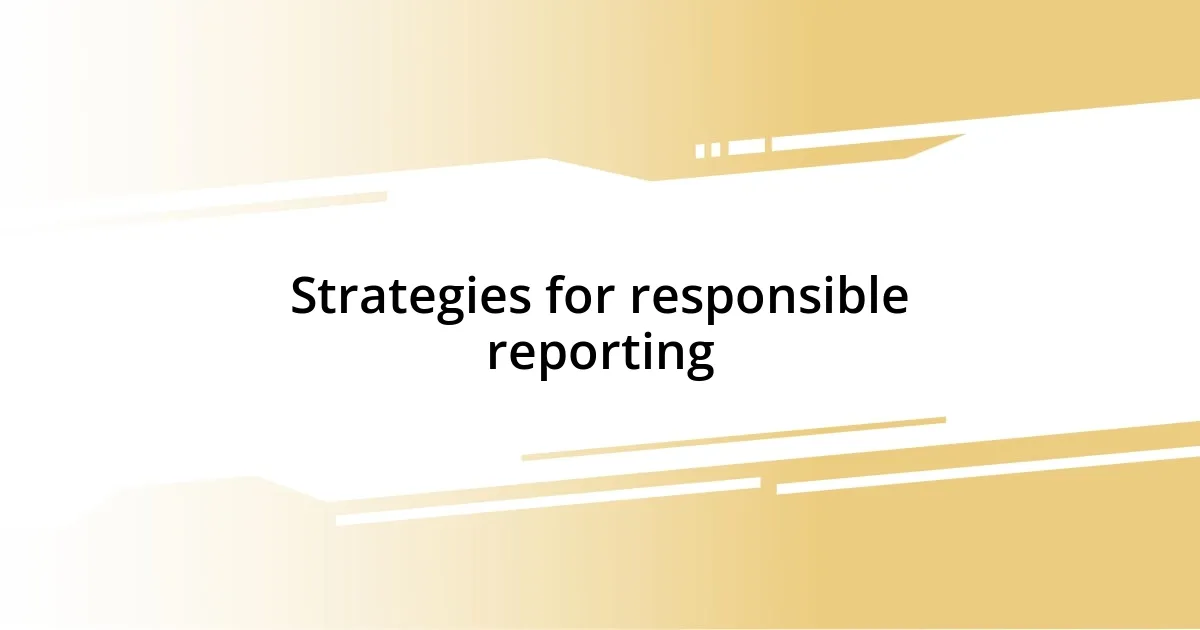
Strategies for responsible reporting
When it comes to responsible reporting, a fundamental strategy is to verify facts before publication. I once rushed to report on a developing situation, eager to break the story. In my haste, I shared unconfirmed details that later turned out to be inaccurate. The backlash was swift, and I quickly learned that the pressure to be first should never outweigh the responsibility to be right. In my experience, taking that extra step for fact-checking isn’t just a best practice; it’s a cornerstone of building credibility with your audience.
Another vital approach is engaging with the communities you report on. I vividly recall spending time with a local group advocating for environmental changes. By listening to their stories and understanding their motivations, I gained insights that transformed my approach. This collaboration not only enriched my reporting but also built trust within that community. So, I often ask myself, “Am I truly representing the voices in my stories?” It’s a question I encourage every journalist to reflect on continuously.
Moreover, I believe incorporating feedback after publication is essential to responsible journalism. After one of my articles sparked a heated discussion online, I took the time to read through comments and messages. It was enlightening to see how my words had resonated differently across various perspectives. This experience underscored the importance of being open to dialogue and criticism. I realized that responsible reporting doesn’t stop at publishing; it involves an ongoing relationship with the audience to learn and grow together.
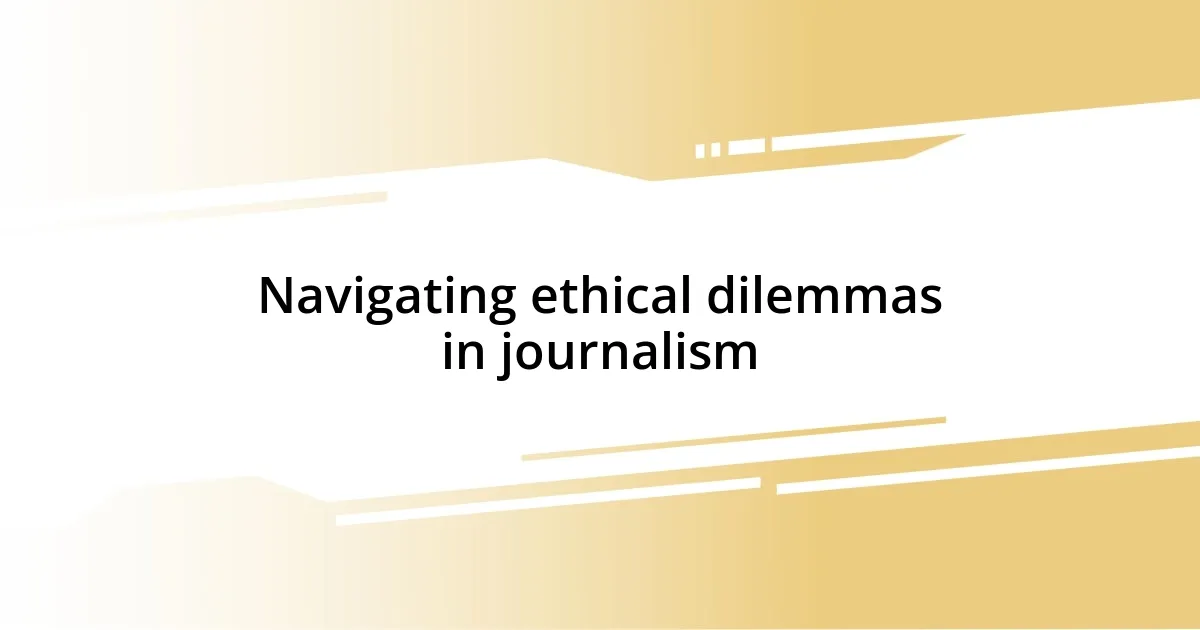
Navigating ethical dilemmas in journalism
Navigating ethical dilemmas in journalism often feels like walking a tightrope. One time, while covering a protest, I found myself torn between the need to capture the passion of the crowd and the reality that some individuals were being targeted with negative headlines. I realized that it’s crucial to ask, “Am I amplifying their voices or merely exploiting their pain?” This reflection not only shaped my reporting but highlighted the fine line between advocacy and sensationalism.
Ethical dilemmas also emerge when working with confidential sources. While I value the trust placed in me, there was an occasion when I had to decide whether to protect a source’s anonymity or disclose vital information to foster transparency. The discomfort of this choice lingered with me. I grappled with whether I was prioritizing my journalistic integrity over the greater good. It made me think deeply about the weight of responsibility we carry as journalists.
Ultimately, it’s about more than just adhering to a code of ethics; it’s about what sits heavy on your conscience. There was a story I chose not to pursue, one involving a whistleblower in a major corporation, fearing the repercussions for them. I still ponder, “Did I make the right choice?” It’s moments like these that remind me that ethical journalism isn’t just about rules; it’s about humanity, respect, and the impact we have on real lives.
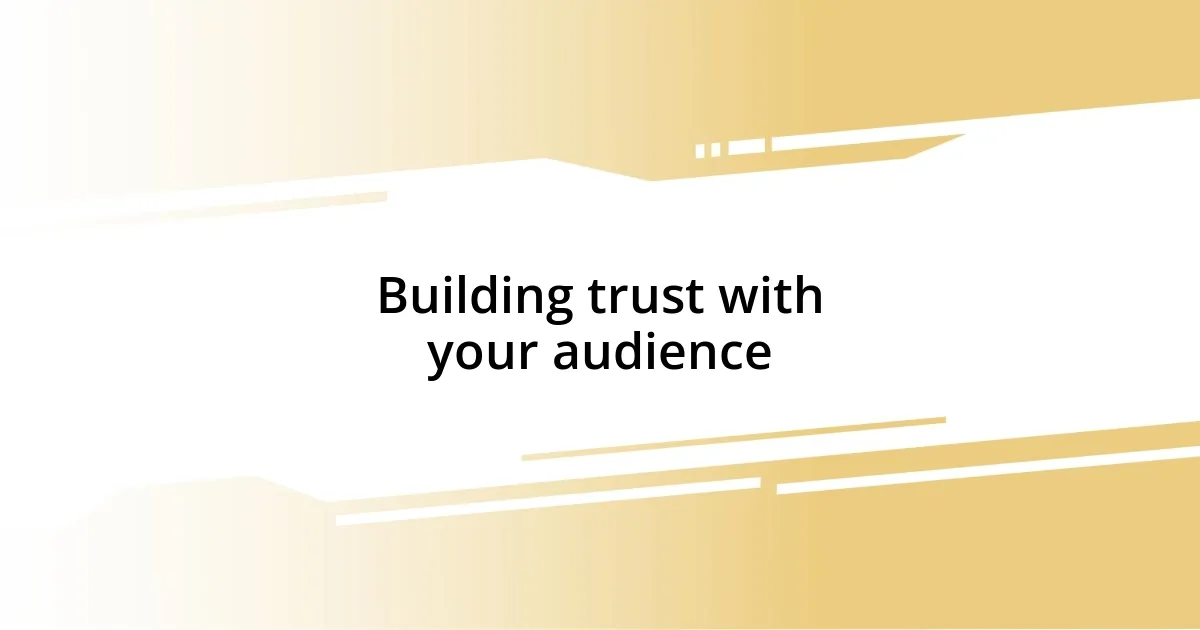
Building trust with your audience
Building trust is the lifeblood of ethical journalism. I remember a particular instance when I covered a sensitive topic involving a community member’s tragic loss. Instead of jumping straight into the story, I reached out to the family first. They were understandably hesitant, but by showing genuine empathy and taking the time to listen, they ultimately agreed to share their narrative. That interaction not only deepened my understanding of the story but also fostered a mutual respect that I believe resonated with the readers. Trust doesn’t just happen; it’s cultivated through sincerity and respect.
Moreover, transparency plays a critical role in maintaining audience trust. I once published an article containing potentially controversial opinions. Instead of shying away from the backlash, I decided to host an open forum where readers could discuss their thoughts directly with me. This not only helped clarify my position but turned a potential conflict into a constructive dialogue. It made me realize that encouraging audience participation fosters a sense of ownership over the story, which, in turn, builds a bridge of trust.
Lastly, I find that consistency in tone and message helps solidify this trust. Early in my career, I had an unsettling experience when my writing style shifted dramatically between two articles on similar topics. Readers were confused, and I felt like I let them down. Since then, I’ve made it a point to stay true to my voice so that audiences know what to expect from me. It’s a reminder that trust is maintained by being reliable and authentic in every piece we produce. Have you ever reflected on how your own writing consistency affects your relationship with your audience? I know I have, and it’s been a learning journey, realizing how much each word truly matters.








